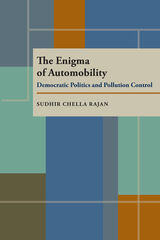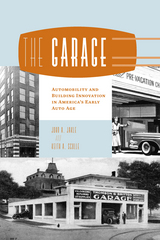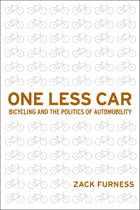

Beginning with the days when only the wealthy could afford cars (and their chauffeurs doubled as mechanics), the authors show how blacksmiths and carriage repairmen quickly adapted to the increasing ubiquity of the automobile. Noting differences from region to region as well as between large cities and smaller population centers, they look at the growth of car dealerships, with their separation of service and sales floors, and the parallel rise of small, independent repair shops—businesses that have steadily disappeared from the national scene, though some of the buildings that once housed them have survived, refitted for other purposes. The domestic garage—first conceived as a detached structure, then integrated with the house itself—gets its own chapter. And throughout, the authors explore the various ways in which concerns with practicality, commerce, and aesthetics have dictated how garages were laid out and constructed and what services they offered.
A worthy complement to the authors’ earlier collaborative studies of the gas station and the parking lot, The Garage will engage an eclectic audience of architectural and material-culture specialists, historic preservationists, antique car enthusiasts, local historians, and others fascinated by the impact of the automobile on early America and its legacy in the built environment of modern communities.

Although millions of people in the United States love to ride bicycles for exercise or leisure, statistics show that only 1% of the total U.S. population ride bicycles for transportation—and barely half as many use bikes to commute to work. In his original and exciting book, One Less Car, Zack Furness examines what it means historically, culturally, socioeconomically, and politically to be a bicycle transportation advocate/activist.
Presenting an underground subculture of bike enthusiasts who aggressively resist car culture, Furness maps out the cultural trajectories between mobility, technology, urban space and everyday life. He connects bicycling to radical politics, public demonstrations, alternative media production (e.g., ‘zines), as well as to the development of community programs throughout the world.
One Less Car also positions the bicycle as an object with which to analyze and critique some of the dominant cultural and political formations in the U.S.—and even breaks down barriers of race, class and gender privilege that are interconnected to mobility. For Furness, bicycles not only liberate people from technology, they also support social and environmental justice. So, he asks, Why aren’t more Americans adopting them for their transportation needs?
READERS
Browse our collection.
PUBLISHERS
See BiblioVault's publisher services.
STUDENT SERVICES
Files for college accessibility offices.
UChicago Accessibility Resources
home | accessibility | search | about | contact us
BiblioVault ® 2001 - 2024
The University of Chicago Press









